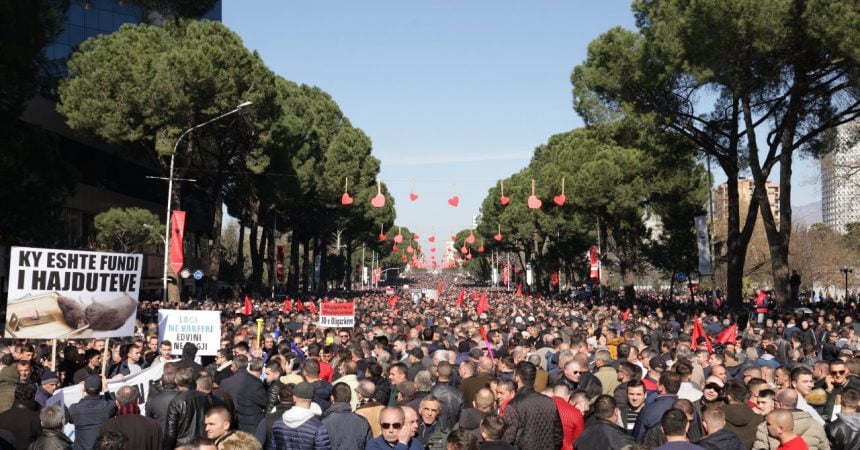Anti-government protests have continued in the Albanian capital of Tirana where the Opposition party and citizens have been demanding the resignation of Prime Minister Edi Rama since February.
Protestors are calling for not only the resignation of Rama but the installation of a transitional government, electoral reform, and a free and fair election. Doubt has been cast over the legitimacy of the current socialist government due to published wiretaps showing collusion between incumbent politicians and criminal gangs to buy votes prior to the 2017 general election.
To date, no investigation has been conducted into the recordings and no politicians have been arrested or suspended.
The Opposition party has also resigned from parliament and refused to take part in the June local elections until their demand for a legitimate election is met.
The protests, attended by tens of thousands of people have been largely peaceful but fringe groups of protestors have been involved in vandalism and minor scuffles with law enforcement.
Molotov cocktails, firecrackers and flares were thrown at the Prime Minister’s office and the Police Directorate over the last two days. Protestors claim that a number of citizens are being held unfairly and they are demanding their release. No serious injury or damage to property has been reported to date.
The Albanian government, however, has used tear gas indiscriminately resulting in a number of reports of hospitalisations due to respiratory issues. Women, children, elderly people, police and journalists have all been repeatedly hit.
On Saturday, the gas made its way into the maternity ward of a local hospital as well as local businesses and nearby homes.
During a protest last month, one journalist was rendered unconscious from tear gas, and others were forced to stop broadcasting or seek medical assistance for respiratory issues. In addition, a photographer was hit on the head with a policeman’s baton, resulting in a large gash on his head. Another journalist was hospitalised on Saturday following exposure to gas.
https://twitter.com/RSF_Europe/status/1118071965565313024
Reporters Without Borders (RSF) and the Committee to Protect Journalists (CPJ) have urged the Albanian government not to use “disproportionate violence” against journalists.
Western embassies in the capital also called on the police to show restraint and respect the rule of law that they are supposed to uphold.
During Saturday’s protest, a video emerged that showed around 10 riot police beating an unarmed man on the streets near the country’s parliament.
Sahit Dollapi, a member of the opposition Democratic Party was shown having his gas mask forcibly removed and then being stopped from replacing it to protect himself. He was then chased and beaten, resulting in a serious leg injury and a dislocated shoulder. Dollapi was detained by the police and he was refused medical care and access to the Ombudsman, despite such refusal being illegal.
Interior Minister Sander Lleshaj gave a statement to the media on Sunday saying that the detention of Dollapi had been handled poorly but that the police had behaved in a professional manner.
The Albanian government remains adamant that it will not give in to the demands of the opposition parties. The have labelled the protests as an attempt to derail the expected decision of the European Council in June on whether Albania will open EU accession negotiations.
A number of European politicians have recently contradicted this by saying that they cannot support negotiations until an investigation into the vote rigging scandal occurs.
Citizens are also protesting against the lack of rule of law in the country and the ongoing judicial crisis resulting from an internationally-led judicial vetting process.
Just over 50% of all judges and magistrates that have been vetted so far have either quit, or been dismissed over allegations of corruption, resulting in a situation where the country will experience a shortage of qualified legal professionals.
Citizens are also protesting against the mass demolition of citizens’ homes to make way for a road project that was found to have been won by a government-linked company that forged its incorporation documents.
Others have been protesting everyday for over a year against the proposed demolition of the National Theatre. The government wants to sell public land to a private company so that a multi-million commercial property can be built in its place.
Corruption and links to organised crime have been a hallmark of Albanian politics since the transition from communism in the early 90s. This has been allowed to reach unprecedented levels under the current government with multiple Ministers found to have links to drug trafficking and financial indiscretions to to the tune of millions.
Journalists who have reported on the protests have also found themselves in the firing line. Editors of several foreign portals have been contacted by Albanian ambassadors in their respective countries, first via letter and then in face to face meetings. Additionally two foreign journalists reporting from within the country, have both found themselves targeted by authorities.
Alice Elizabeth Taylor is reporting from Albania.













